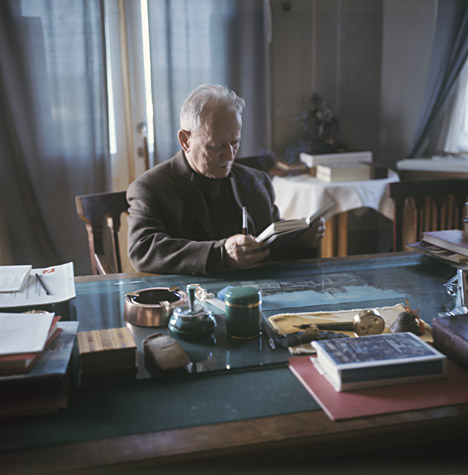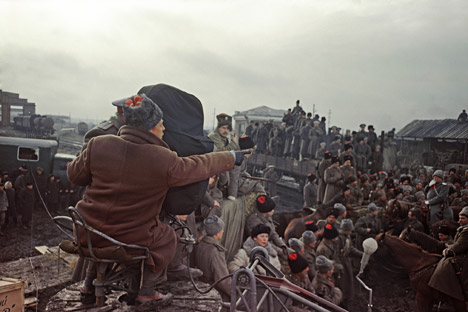
Sholokhov in his cabinet. Source: RIA Novosti / Ivan Denisenko
Mikhail Sholokhov is most famous for his epic four-volume novel And Quiet Flows the Don (1928-1932) about Don Cossacks during the World War I and the subsequent Civil War. A must-read of classic Russian literature, its author has sparked mystery, controversy and praise in equal measure.
Sholokhov spent his childhood on a Cossack khutor – a single homestead or a small collection of homesteads – but it is not known exactly where he was born.
Although Sholokhov wrote so vividly and extensively about Cossacks, he was not actually a Cossack. His father was a middle-class manager of a steam mill, while his mother was a peasant who had been a servant before her marriage. Sholokhov was born as an illegitimate child, since his mother had been forced to marry the other man rather than his father. It was only after the writer’s stepfather died that his parents could finally get married.
In 1964, French writer and philosopher Jean-Paul Sartre rejected the Nobel Prize for Literature, writing a statement expressing regret that the previous prize had not been awarded to Sholokhov, and that "the only Soviet work that received the prize was a book published abroad and banned in its own country" (meaning Doctor Zhivago by Boris Pasternak, who won the Nobel Prize for Literature in 1958)
It is believed that this statement influenced the Nobel Committee, and the prize was awarded to Sholokhov the following year "for the artistic power and integrity with which, in his epic of the Don, he has given expression to a historic phase in the life of the Russian people."
The novel was adapted for the screen three times in Russia during the 20th century (1930, 1958, 1992). The 1958 screen version made by renowned director Sergei Gerasimov has received numerous international awards.

During the filming of Gerasimov's version. Source: TASS
The equally famous Sergei Bondarchuk, who had already won an Oscar and a Golden Globe for his screen version of War and Peace, directed the third version.
This film was co-produced by the USSR, UK and Italy. The Italian producer filed for bankruptcy, and an Italian bank seized the almost completed film as part of the debt proceedings.
Bondarchuk died without seeing the film on screen; his son, Fyodor Bondarchuk, later produced an abridged version for TV.
Sholokhov worked from the age of 15 in various professions, including as a porter and a schoolteacher. In 1922, while working as a village tax inspector, he was arrested for taking a bribe and sentenced to death by firing squad at a tribunal.
His father paid the hefty bail and produced a new certificate to the court stating that Sholokhov was 15 rather than 17. The death sentence was commuted to a year in a penal colony for minors. Sholokhov was being transported to the colony under escort, but he never arrived and did not serve any time. It is unclear exactly what happened during that journey.
Some critics challenged Sholokhov’s authorship of And Quiet Flows the Don, alleging that he had taken credit for the work of a White officer who had been shot by the Bolsheviks. These doubts were also fuelled by the view that such a profound, lengthy, subtle work could not have been written by a barely educated 21-year-old.
Sholokhov's supporters responded by pointing to young geniuses like Johann Goethe, Thomas Mann and John Keats, as well as the poorly educated Maxim Gorky and Ivan Bunin (also a Nobel laureate).
The issue was finally resolved in 1984, when the Slavicist Geir Kjetsaa and his colleagues conducted extensive linguistic tests on the work that supported Sholokhov’s authorship.
These two authors, both Nobel laureates, had a prickly relationship. Sholokhov wrote a highly critical review of Solzhenitsyn’s work One Day in the Life of Ivan Denisovich, and Solzhenitsyn responded by rekindling the accusations of plagiarism against the other writer.
In turn, Sholokhov supported Solzhenitsyn’s persecution and signed the infamous letter sent by a group of Soviet writers to the editor of Pravda newspaper on Aug. 31, 1973, in which Solzhenitsyn and Sakharov were accused of trying to "generate distrust towards the Soviet state’s peaceable policies." In addition, Sholokhov, who was a supporter of the Communist Party, opposed awarding Solzhenitsyn's novel One Day in the Life of Ivan Denisovich the Lenin Prize.
The authors would later refuse to comment on their view of each other’s work.
All rights reserved by Rossiyskaya Gazeta.
Subscribe
to our newsletter!
Get the week's best stories straight to your inbox